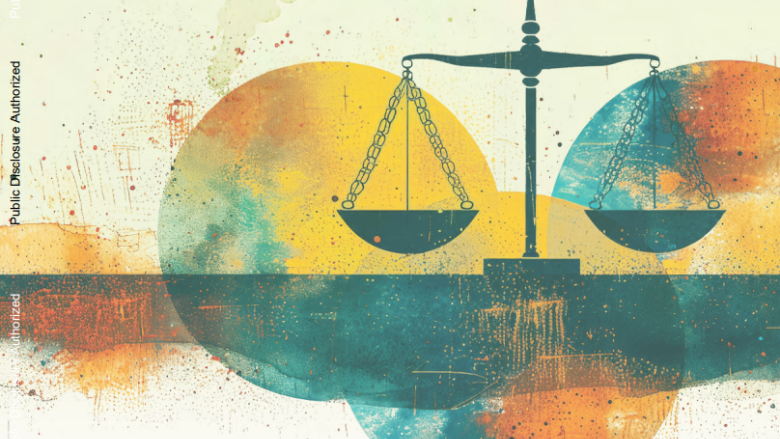Governance & Institutions Umbrella Program (G&I)
Publications & Knowledge
-
Social Contract Factsheets2025
The Social Contract Factsheets and accompanying dataset provide key indicators to characterize the social contracts of countries across all regions over the past 20 years. Developed using the methodology from the 2021 World Bank report, Social Contracts for Development: Bargaining, Contention, and Social Inclusion in Sub-Saharan Africa, the factsheets offer valuable insights into the socio-political dynamics shaping policy and development outcomes. Social contract analysis is an increasingly important framework for the World Bank and its partners in understanding and advancing development. Read more about the Factsheets on the Coalitions for Reforms Global Program webpage.
-
Zambia: Assessment of Access to Justice and Alternative Dispute Resolution Systems2025
This report analyzes two areas of the Zambian justice sector. First, factors impeding demand side/user aspects of access to justice, especially in underserved areas of Zambia. Secondly, it analyzes alternative dispute resolution (ADR) processes and systems in Zambia and their potential to offset the constraints of the overburdened formal court system.
-
Reforming Justice: Balancing Efficiency and Accessibility through Judicial Map Reform2025
Judicial map reforms refer to an emerging stream of reform programs that attempts to improve the responsiveness of the justice system by adjusting the courts’ location, size, and jurisdiction to demographic and socio-economic factors. Building on the World Bank’s experience in supporting client countries reform their judicial maps, this Brief lays out a framework for the design and implementation of such programs. It explains why countries attempt to revise their judicial maps, how they do it, and what types of policy interventions it entails. It also highlights the significance of judicial and demographic data, the need for clearly defined criteria, and the importance of communication and impact evaluation for the successful implementation of reforms.
-
Reforming Justice - Fostering Engagement Between Statutory Courts and Customary Law Systems2025
This Brief examines the complex relationship between statutory courts and customary law systems, highlighting the historical context that fostered legal pluralism in many countries. It argues that attempts to replace customary practices with uniform legal frameworks have largely failed, suggesting instead that a harmonious coexistence of these systems can enhance access to justice and fairness. The Brief identifies practical mechanisms for engagement, emphasizing the need for context-sensitive approaches that recognize the ingrained nature of customary systems, especially in regions where they are preferred for their accessibility and cultural relevance. The Brief highlights several factors that should be considered when designing engagement, including state recognition; jurisdiction; articulation and documentation of customary law; referral pathways; appeal pathways; and oversight and accountability.
-
Reforming Justice: Benchmarking Judicial Effectiveness through the JUPITER Assessment2025
The Justice Pillars Towards Evidence-Based Reform (JUPITER) initiative is a tool developed by the World Bank’s Global Program on Justice and the Rule of Law to assess the effectiveness of justice systems in various countries. JUPITER evaluates judicial performance based on three key pillars: access, efficiency, and quality. It is designed to be standardized and flexible, allowing for country-specific assessments. The initiative focuses on areas with proven empirical links to outcomes, emphasizing the law and its application to identify implementation gaps. It assesses formal and customary justice institutions across entire countries, with examples from its application in Liberia and South Sudan. The Brief highlights the importance of access, efficiency, and quality in justice delivery and explains how JUPITER measures these aspects. It also discusses the potential for cross-country comparisons as more data is collected through the JUPITER assessments.
-
 Supporting Access to Justice in South Sudan - A 2025 JUPITER Assessment2025
Supporting Access to Justice in South Sudan - A 2025 JUPITER Assessment2025This report assesses the state and performance of the justice system of South Sudan through the JUPITER methodology.The study focuses on the system’s effectiveness in service delivery across three areas: Access to Justice, Efficiency, and Quality. JUPITER aims to identify strengths and areas of improvement in these key areas, serving as a basis for policy dialogue.
-
Hindering or enabling? The role of states in MIC to HIC transitions in ECA2025
Building and adapting states for economic growth and innovation is both a challenge and opportunity in Europe and Central Asia (ECA). Effective states provide frameworks for markets and innovation, but many struggle with state capture and resource management. Experiences from ECA countries, Finland, and South Korea highlight the importance of supportive institutions for knowledge economies.
-
JUPITER Methodological Note2025
JUPITER is an initiative of the Global Program on Justice and the Rule of Law of the World Bank Group (WBG). It is a country-based framework for measuring the effectiveness of a country’s judiciary. It uses data to identify strengths and weaknesses around key pillars of judicial effectiveness. The output is a study that provides the analytical underpinning for dialogue on justice reform and helps prioritize efforts according to a country’s needs.
-
Reforming Justice: Increasing Access through Small Claim Courts2024
Small claims courts and procedures can enhance the efficiency and accessibility of the justice system by streamlining judicial processes and increasing access to justice for individuals and small businesses. This note analyzes key components of effective small claims systems and offers recommendations for jurisdictions to refine their small claims systems based on empirical evidence from countries around the world.
-
Reforming Justice: Engaging with Countries on Judicial Budgets2024
Adequate budgeting of the judiciary is essential for effective justice delivery. This note presents trends in judicial budgets and judicial budgeting reforms. Courts account for less than 2 percent of total government expenditure on average, with significant portions dedicated to fixed costs like salaries. The findings emphasize the need for judicial leaders to continuously advocate for resources by demonstrating the judiciary’s integral role in maintaining law and order, promoting democracy, and fostering societal stability.
-
Governance and Institutions Umbrella Program Annual Report FY 20242024
The current global landscape is marked by conflicts, extreme weather events, and the unequal economic rebound from the pandemic. These challenges have underscored the importance of good governance and robust institutions. Responding to this need, the Governance and Institutions Umbrella Program (G&I) collaborates with donors to bolster government effectiveness and accountability.
Read the report -
Governance and Institutions Umbrella Program Annual Report FY 20232023
The Governance and Institutions Umbrella Program (G&I) was established in 2022 as a platform to convene key stakeholders with a common vision and purpose – to share knowledge and resources to advance good governance. The Program hit the ground running with activities across the globe, with the support of partners and country teams. It leveraged global networks, created a robust infrastructure for operations, pooled knowledge and resources, and explored innovative solutions. More in this Annual Report for Fiscal Year 2023.
-
Addressing Corruption Risks to Safeguard the Response to Climate ChangeDiscussion Draft II | 2023
This discussion note stresses the importance of addressing corruption within climate change initiatives. As trillions are needed for mitigation, adaptation, and resilience, the potential for corruption is high. It can derail climate policies, misdirect funds, damage public trust, and discourage private investment, worsening disparities particularly in poorer nations. The note serves to inform and guide policymakers and practitioners on integrating anti-corruption strategies into climate change efforts.
-
Improving Justice in Liberia - A 2023 JUPITER Assessment2023
Liberia performs poorly in international datasets benchmarking justice and the rule of law. For instance, in the World Justice Project Rule of Law Index (WJP RLI), it ranked 112 out of 140 countries in 2022, meaning that it is among the thirty countries with the weakest adherence to the rule of law. This study originates from the Government’s desire to improve the delivery of justice to its citizens through a practical sequence of steps that are underpinned by hard data and analytics.
-
Justice Factsheets
While several existing datasets measure citizens’ or businesses’ perceptions of judicial independence and efficiency, there is no consolidated dataset of attitudes towards the judiciary, despite data being the traditional entry point for justice and rule of law reform. The Justice Factsheets aim to fill this gap by presenting a focused dataset with insights, which allow the production of country profiles and broad-based cross-country analytics that can be used when engaging with governments. Through a customizable and user-friendly interface, the Justice Factsheets offer open and freely available for download data with multiple visualizations of a country’s justice service delivery performance relative to a set of comparators.
Newsletter Subscription
-
Institutions Global Department Newsletter
Institutions Global Department Newsletter
Helping client countries build capable, efficient, open, inclusive, and accountable institutions. Receive monthly updates on all things in Institutions, and quarterly special editions on GovTech.Subscribe Now















